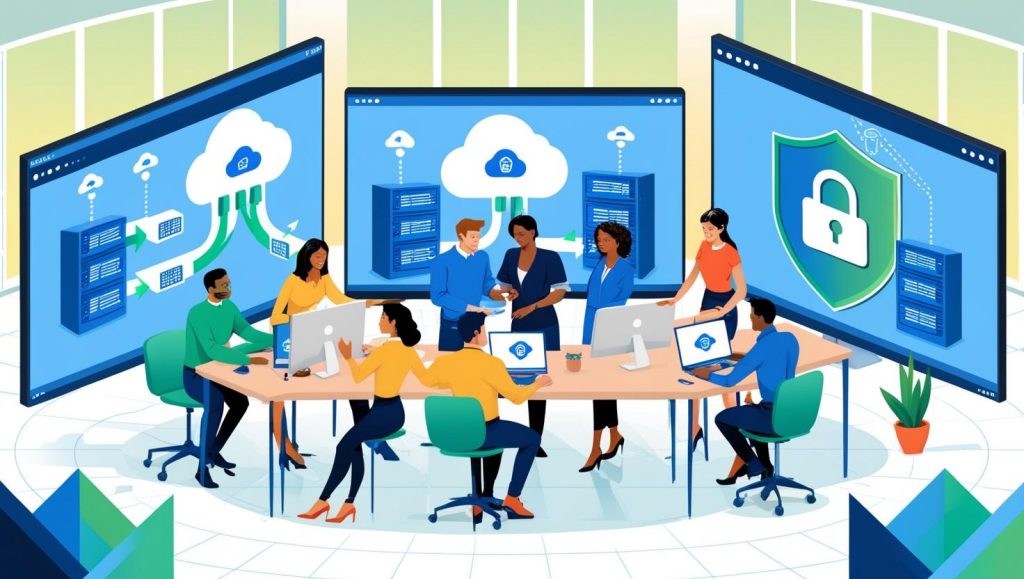As organizations increasingly adopt cloud technologies, the need for effective cloud training and support becomes paramount. Ensuring that your team is equipped with the necessary skills and knowledge is essential for successful cloud adoption. In this blog, we will explore different strategies for cloud training and support, including cloud certification training, on-demand technical support, and user training and workshops. We will guide you in choosing the best approach for your organization, focusing on how to maximize the benefits of cloud technologies.
The Importance of Cloud Training and Support
Cloud training and support are crucial for organizations moving to the cloud. With a well-trained team, organizations can optimize their cloud usage, improve security, and ensure compliance with regulations. Effective training helps in understanding cloud functionalities, improving collaboration, and enhancing productivity.
Organizations must prioritize investing in training and support to fully leverage the benefits of their cloud investments. A comprehensive approach will cover various aspects, including technical skills, compliance knowledge, and practical application.
Strategies for Cloud Training and Support
When implementing cloud training and support, organizations can choose from several strategies. The three primary approaches are cloud certification training, on-demand technical support, and user training and workshops. Each approach has its unique advantages and considerations.
1. Cloud Certification Training
Cloud certification training is essential for team members seeking formal recognition of their cloud skills. Certification programs provide structured learning paths and ensure that employees understand the technical aspects of cloud services. Benefits include:
- Enhanced Knowledge: Certification programs cover in-depth topics, from foundational concepts to advanced cloud technologies.
- Industry Recognition: Certified professionals are more likely to gain credibility and recognition in the industry, enhancing their career prospects.
- Increased Confidence: Employees gain confidence in their abilities, leading to improved job performance and productivity.
Investing in certification training can also contribute to cost savings in the long run. With a skilled workforce, organizations can reduce reliance on external consultants and enhance internal problem-solving capabilities.
2. On-Demand Technical Support
On-demand technical support provides immediate assistance for technical issues and challenges. This approach ensures that employees can quickly resolve problems without unnecessary delays. Key benefits include:
- Rapid Issue Resolution: On-demand support helps resolve issues promptly, minimizing downtime and maintaining productivity.
- Flexibility: Teams can access support when needed, accommodating varying workloads and schedules.
- Knowledge Sharing: Technical support teams can share valuable insights and solutions that enhance overall organizational knowledge.
Having reliable on-demand support is vital for organizations with legacy applications and complex cloud environments. It ensures that teams can navigate challenges effectively and maintain business continuity.
3. User Training and Workshops
User training and workshops focus on educating employees about specific cloud services and applications. This hands-on approach encourages engagement and practical learning. Benefits include:
- Tailored Learning: Workshops can be customized to address the unique needs of different teams within the organization.
- Enhanced Collaboration: Interactive training sessions promote collaboration among team members, fostering a culture of knowledge sharing.
- Improved Adoption Rates: Employees are more likely to embrace cloud technologies when they receive effective training.
Implementing user training and workshops can significantly enhance the effectiveness of cloud adoption efforts. It equips employees with the skills they need to use cloud solutions efficiently.
Explore Our Cloud Services at a Glance
Connecting You to the Cloud Effortlessly!
Choosing the Right Approach for Your Organization
Selecting the right cloud training and support approach depends on various factors, including your organization’s specific needs, budget, and goals. Here are some considerations to help guide your decision:
- Assess Skill Levels: Evaluate the current skill levels of your team. Identify gaps in knowledge that need to be addressed through training.
- Define Objectives: Clearly outline your training objectives. Determine whether you need formal certifications, on-demand support, or hands-on workshops.
- Budget Constraints: Consider your budget for training and support. Certification programs may require a larger investment, while on-demand support can offer flexibility.
- Business Goals: Align your training approach with your organization’s strategic goals. Ensure that the chosen strategy supports your overall cloud adoption objectives.
- Feedback Mechanisms: Implement feedback mechanisms to assess the effectiveness of your training and support programs. Use this feedback to continuously improve your approach.
Best Practices for Cloud Training and Support
To maximize the effectiveness of your cloud training and support initiatives, consider these best practices:
- Establish Clear Policies: Define policies and procedures for cloud training and support. Ensure all employees are aware of available resources and expectations.
- Regularly Update Training Materials: Keep training materials up to date with the latest cloud technologies and best practices. This ensures employees have access to relevant information.
- Encourage Continuous Learning: Foster a culture of continuous learning within your organization. Encourage employees to pursue additional training and certifications.
- Leverage External Resources: Consider partnering with cloud service providers or training organizations for additional support and resources.
- Measure Success: Track the effectiveness of your training and support initiatives. Use metrics to assess employee performance and identify areas for improvement.
Frequently Asked Questions (FAQs)
- What is cloud certification training?
Cloud certification training is a formal program that validates an individual’s skills and knowledge in cloud technologies.
- Why is on-demand technical support important?
On-demand technical support provides immediate assistance for technical issues, minimizing downtime and ensuring productivity.
- What types of user training and workshops are available?
User training and workshops can include hands-on sessions, tailored training programs, and interactive learning experiences.
- How can organizations assess training needs?
Organizations can assess training needs by evaluating current skill levels, identifying knowledge gaps, and aligning training with business objectives.
- What are the benefits of investing in cloud training?
Investing in cloud training enhances employee skills, increases confidence, and leads to better cloud usage, ultimately improving organizational performance.



